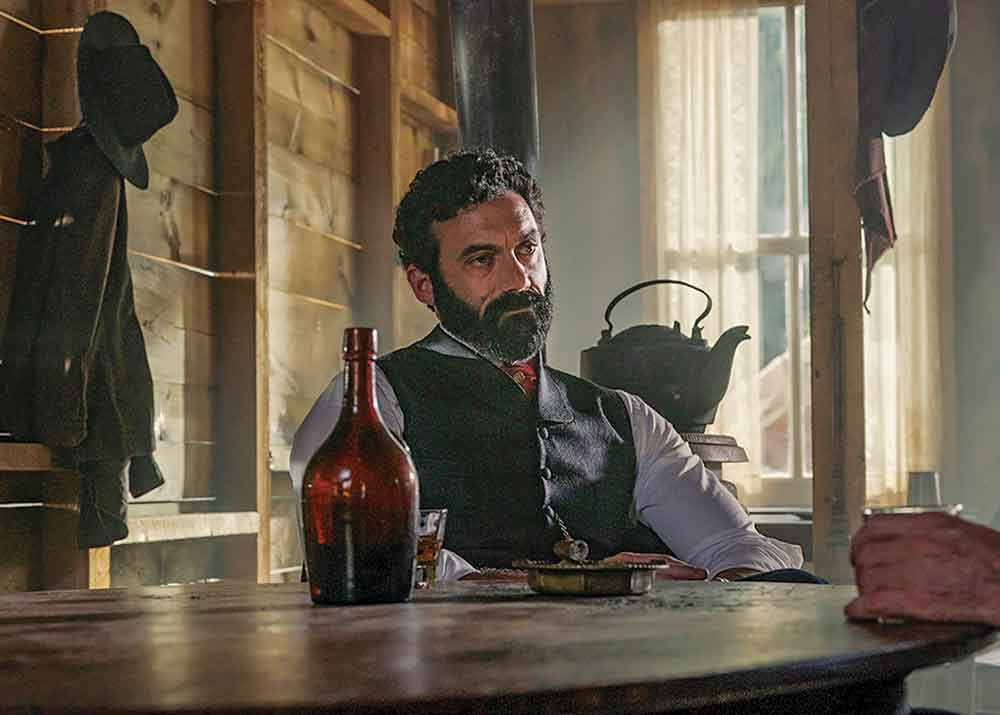Change is in the air throughout the third season of lavish period drama The Gilded Age
When we last left The Gilded Age, we were in the throes of the Opera War, which ended without bloodshed and with the Russell family at the height of New York society. Now, Bertha Russell (Carrie Coon) has set her sights on a manoeuvre that would elevate her family to unimaginable heights while her husband George (Morgan Spector) is risking everything on a gambit that could revolutionize the railroad industry. Thematically, the entire season deals with power. “Who’s in charge in society, who’s in charge of marriages, who has the power?” ponders series co-writer and executive producer Sonja Warfield. “I think the power shift is relevant to all the stories and all the characters.”

Across the street at the Brook household, life was thrown into chaos as Ada Brook Forte (Cynthia Nixon) inherited her late husband’s fortune and is ostensibly in charge while sister Agnes (Christine Baranski) has found her social standing altered. “I’m rather fascinated by people who pretend that the loss of money and loss of position doesn’t affect them at all, and everything can just go on as it did before,” says series creator Julian Fellowes. “Here we have Agnes, whose belief in the essentially European concept of greatness by birth can’t be shifted. She starts out confident that everything will be as normal. But we know it won’t.”

But while the financial reins sit in Ada’s hands, Fellowes believes much power remains with her sister. “Agnes knows the real issue of the day is whether or not women will get the vote. And that compared to that, everything else is not even secondary — it’s a long way in the distance. The women who change things are the Agneses,” he says. For Baranski, her stern character’s progressive thinking became clear from the way she advocated for former secretary Peggy Scott (Denée Benton). “She recognized that this incredibly articulate, bright woman walks into the house and takes her on and supports her,” says Baranski.
Now a writer, Peggy’s independence and resolve become both an attraction and a hindrance when she meets romantic interest Dr. William Kirkland, played by Jordan Donica. With chatter of a spinoff for Peggy, Benton will only say that she is happy in her character’s shoes. “Getting to be a part of what has become one of the most unique parts of our show will be a legacy that I will be soaking in for the rest of my career as an artist,” she says. “I’m getting to embody something really important and I would want to know more and see exactly what the Scotts go on to do.”

For Donica, the experience of joining the historical drama has been a learning experience, from a research point of view rather than fitting in, which the musical actor says felt seamless. “I’ve done a lot of period pieces in France, and so I’ve known a lot about African history globally, but I never really looked at African American history beyond what we’re taught in school,” he says. “To realize that there were free Africans here has been such an educational experience. I’m excited because hopefully it gives people today language to be able to have tough conversations [about issues] that are still affecting our Black community today.”

Struggling with powerlessness of a different kind is Gladys Russell (Taissa Farmiga), who becomes her mother’s instrument to ascend even higher on the social ladder — a decision that puts Bertha at odds with her husband. “The rift that develops between them is not a minor one and what is being expressed through that disagreement are the same shared values and ambitions that brought them together in the first place. They really see the situation of Gladys’ marriage in a fundamentally different way,” says Spector. But Coon stands by Bertha’s motivations. “George can’t really understand the stakes for a woman,” she says. “He doesn’t understand our instinct for survival, which is, in this case, through marriage, and that Bertha really believes what she’s doing is an existential question. She wants her daughter to be safe. She also wants her to be fulfilled and have a sense of purpose, because she’s hungry for her daughter to have a kind of power she didn’t have.”

As the cast explores political and social strife in the 19th century, Baranski can’t help but point out the positive ways Agnes has bled into her private life. “I try to speak now in declarative sentences,” she says. “This is a woman I always call a walking declarative sentence. She says what she means, whether you agree with her or not. She has the courage to just say, ‘This is the fact, this is how I feel,’ and she doesn’t spend a lot of time apologizing for it, which I think is a lesson for all women. We tend to qualify or say, ‘I’m so sorry, but this is how I feel but I understand . . .’ That’s not Agnes. She says, ‘I don’t particularly like that outfit you’re wearing.’ I think that’s a lovely lesson from Aunt Agnes.”
The Gilded Age airs Sunday, July 13, on HBO Canada
